News & Announcements
- Details
- Written by Joshua Wachtel
Nicola Preston wears many hats, but they all involve restorative practices. She's a lecturer at the IIRP teaching online courses and a special education needs coordinator for a UK primary (elementary) school. She says that restorative practices have even made a big impact in her personal and family life.
- Details
- Written by Joshua Wachtel
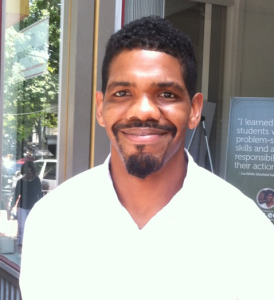 Educational associate Harik Cofer didn’t “buy into” restorative practices at first. “Why would I do that fluffy stuff?” In his position — similar to middle school assistant principal — at National Academy Foundation School, in Baltimore, he was focused on closing the achievement gap through curriculum and academics. “Little did I know that if I did the community building first I could exceed expectations.”
Educational associate Harik Cofer didn’t “buy into” restorative practices at first. “Why would I do that fluffy stuff?” In his position — similar to middle school assistant principal — at National Academy Foundation School, in Baltimore, he was focused on closing the achievement gap through curriculum and academics. “Little did I know that if I did the community building first I could exceed expectations.”
Cofer says his school is probably one of the better educational institutions in Baltimore City, but there are still plenty of problems. In particular, he laments the loss of feelings of pride and community kids used to have about school.
- Details
- Written by IIRP Staff
An invitation to students, parents, teachers and community organizations
Introduction to Restorative Practices – An Educational Workshop
Two dates: 8:30 am–3:30 pm, Saturday, August 16 or 8:30 am–3:30 pm, Tuesday, August 26
Location: John Bartram High School, 2401 S. 67th St., Philadelphia, PA 19142
- Details
- Written by Joshua Wachtel
Natalie Medina, an actor who also teaches theater to youth in Panama with Fundación Amaneceres, discusses why kids like the combination of theater and circles, the importance of the talking piece and a play young refugees developed inspired during a circle discussion.
- Details
- Written by Joshua Wachtel
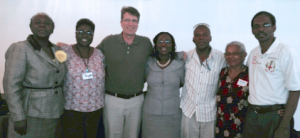 IIRP Trainer Lee Rush during a Training of Trainers in Jamaica. Slain peace worker Mohan Bunwarrie is second from Rush's left.“My goal is to make Jamaica a restorative country,” said Carol Palmer, Permanent Secretary of the Jamaican Ministry of Justice. “I know this vision is grand and beyond one generation. But I believe we can do something to change the fact that too many Jamaicans do not know how to settle differences and disputes peacefully, and instead perpetuate violence amongst each other and our communities.”
IIRP Trainer Lee Rush during a Training of Trainers in Jamaica. Slain peace worker Mohan Bunwarrie is second from Rush's left.“My goal is to make Jamaica a restorative country,” said Carol Palmer, Permanent Secretary of the Jamaican Ministry of Justice. “I know this vision is grand and beyond one generation. But I believe we can do something to change the fact that too many Jamaicans do not know how to settle differences and disputes peacefully, and instead perpetuate violence amongst each other and our communities.”
Last year, Jamaica, as a key component of implementing its National Restorative Justice Policy, opened seven Community Restorative Justice Centers working officially in 11 communities. In their first phase of implementation, these centers have begun to address community conflicts and complaints outside the formal justice system.
- Details
- Written by Joshua Wachtel
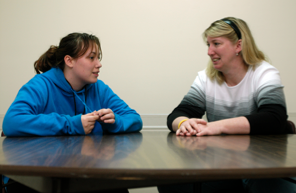 When teenagers turn to drugs and alcohol in ways that damage their lives and relationships, it’s challenging to help them turn their lives around. The choice to use alcohol and drugs can mask other underlying issues, including shame and other painful emotions, and can be exacerbated by the difficulties of communication. This article explores how everyday language can be used within a restorative framework to help parents of teens struggling with drug abuse and addiction to reintegrate in a healthy way with their families, schools, friends and communities.
When teenagers turn to drugs and alcohol in ways that damage their lives and relationships, it’s challenging to help them turn their lives around. The choice to use alcohol and drugs can mask other underlying issues, including shame and other painful emotions, and can be exacerbated by the difficulties of communication. This article explores how everyday language can be used within a restorative framework to help parents of teens struggling with drug abuse and addiction to reintegrate in a healthy way with their families, schools, friends and communities.
Drug and alcohol counselor Elizabeth Smull, who has worked primarily with teens struggling with addiction and their families, uses the full range of restorative practices on a daily basis, especially many of the more informal practices, such as affective statements and questions. Beyond using these techniques, Smull actively teaches those she works with how to use these techniques themselves. This begins immediately after a teen has returned home from a drug and alcohol rehabilitation program or has been court-ordered to a period of juvenile probation.
- Details
- Written by Joshua Wachtel
Schools
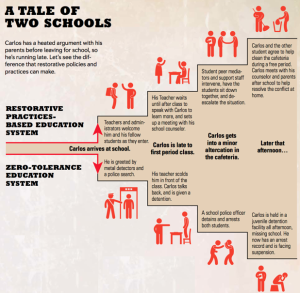 A major report by the Council of State Governments, in support of the US Justice and Education Departments' national school discipline guidelines, shows that the consensus on school discipline "among students, parents, teachers, school administrators, specialized staff, behavioral health professionals, police, probation, court officials, juvenile correctional administrators, and many other expert advisors" includes restorative practices as a core feature. (See p. 4 of the report or 29 of 461 in the pdf.)
A major report by the Council of State Governments, in support of the US Justice and Education Departments' national school discipline guidelines, shows that the consensus on school discipline "among students, parents, teachers, school administrators, specialized staff, behavioral health professionals, police, probation, court officials, juvenile correctional administrators, and many other expert advisors" includes restorative practices as a core feature. (See p. 4 of the report or 29 of 461 in the pdf.)
The National Education Association supports "Sowing Empathy and Justice in Schools Through Restorative Practices."
Educational Leadership publishes "The Power of the Circle" by the IIRP's Laura Mirsky, about the great work being done at Harding Middle School in Philadelphia, PA.
- Details
- Written by IIRP Staff
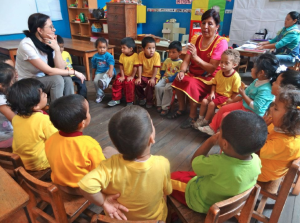 El Instituto Latino Americano de Prácticas Restaurativas (ILAPR), afiliado al IIRP, con sede en Lima, Perú, ha venido trabajando durante tres años para promover el desarrollo de las prácticas restaurativas en todo Sudamérica y México. Jean Schmitz, director del ILAPR, y sus colegas, han proporcionado capacitación básica en prácticas restaurativas a aproximadamente 1,000 personas en siete países, incluyendo a Perú, Brasil, México, Argentina, Bolivia, Ecuador y Colombia. Este desarrollo profesional está comenzando a tener un impacto en los campos de la educación y la justicia penal.
El Instituto Latino Americano de Prácticas Restaurativas (ILAPR), afiliado al IIRP, con sede en Lima, Perú, ha venido trabajando durante tres años para promover el desarrollo de las prácticas restaurativas en todo Sudamérica y México. Jean Schmitz, director del ILAPR, y sus colegas, han proporcionado capacitación básica en prácticas restaurativas a aproximadamente 1,000 personas en siete países, incluyendo a Perú, Brasil, México, Argentina, Bolivia, Ecuador y Colombia. Este desarrollo profesional está comenzando a tener un impacto en los campos de la educación y la justicia penal.
- Details
- Written by Joshua Wachtel
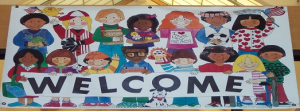 “Usually teachers do too much talking,” said Mike Selvenis, principal of Thomas W. Holtzman Elementary School. “Restorative practices give teachers a way to get out of the way of students. Circles help make the classroom a comfortable place to get conversation going.”
“Usually teachers do too much talking,” said Mike Selvenis, principal of Thomas W. Holtzman Elementary School. “Restorative practices give teachers a way to get out of the way of students. Circles help make the classroom a comfortable place to get conversation going.”
Selvenis has committed Holtzman Elementary, which serves grades three to five and is located on the outskirts of Harrisburg, Pennsylvania, USA, to school-wide restorative practices implementation. “From what I have seen,” he said, “the strongest implication is for the classroom. I see teachers utilizing circles for instruction and actually working on academics. Teachers are using circles to share information and have students report out from groups, talk about their beliefs and argue their points of view. ”
- Details
- Written by Joshua Wachtel
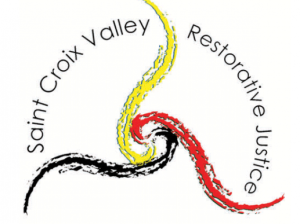
St. Croix Valley Restorative Justice Program (SCVRJP), based in River Falls, Wisconsin, USA, has developed a unique practice for working with young adults who have been arrested for crimes such as underage drinking, possession of drugs and paraphernalia, disorderly conduct and teen driving offenses. Using a restorative circle process, SCVRJP brings together offenders referred by the local courts, universities and high schools, who meet together with previous offenders and other community volunteers who have been impacted by these issues. A volunteer circle-keeper facilitates a focused discussion to present information to participants and to share a variety of perspectives.
The process builds upon victim impact panels (VIP), a process in which victims and family of drunk driving accidents tell their stories to those caught drinking and driving. Often VIPs take place in a hall full of participants, with the victims telling their stories from a podium or stage. Kris Miner, director of SCVRJP since 2004, wanted to make the experience more intimate and meaningful. “We continued to call them panels at first,” she said, “but actually we ran them as restorative justice circles.”

Restorative Works Year in Review 2024 (PDF)
All our donors are acknowledged annually in Restorative Works.
